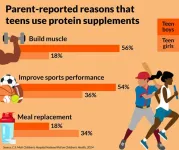(Press-News.org) ANN ARBOR, Mich. – Protein bars, shakes and powders are increasingly popular among adults – but many teens may be jumping on the bandwagon too.
Two in five parents say their teen consumed protein supplements in the past year, according to the University of Michigan Health C.S. Mott Children’s Hospital National Poll on Children’s Health. The trend was more common among teen boys who were also more likely to take protein supplements every day or most days, parents reported.
“Protein is part of a healthy diet but it can be hard for parents to tell if their child is consuming the right amount,” said Mott Poll co-director Sarah Clark, M.P.H.
“Our poll highlights that many teens are using protein supplements, particularly protein powders, to improve their athletic performance and build muscle.”
Using protein supplements for muscle growth, sports
Parents of boys were more likely say their teen consumed protein supplements to boost muscle growth and for athletic training while girls appeared to use them more often to replace a meal when they were busy or to help with a balanced diet.
About one in 10 parents also indicated that their teen used protein supplements to help with weight loss, more commonly reported among parents of teen girls.
Before turning to protein supplements, it’s helpful for parents and teens to think about what they want to accomplish, Clark notes. In many cases, teens can get adequate protein by eating a balanced diet. Consultation with the teen’s primary care provider or a nutritionist can provide insight on whether protein supplements would be helpful and, if so, guidance on what products would best fit with the teen’s goals.
“Despite what some teens - and their parents or coaches - think, eating more protein than what your body needs will not result in larger or faster muscle gains,” she said. “Instead, it’s helpful to consume the recommended amount of protein spread throughout the day, at each meal and snack.”
Choosing wisely
When busy teens have little time to eat, well-meaning parents may replace a meal with what they believe is a healthy alternative. However, parents should not assume that products labelled as high in protein are healthy options.
“Many protein shakes and bars have excessive amounts of added sugar and caffeine that are unhealthy for teens,” Clark said. “Parents should help teens read labels of protein supplements and choose healthy options, such as those that contain fiber, with little or no added sugar.”
“Relying on protein shakes and bars might not provide the necessary vitamins, minerals, and fiber teens need; they aren’t meant to replace balanced meals.”
Monitoring whether teens get enough protein
Many parents think their teen’s protein intake is lacking, with nearly one in five saying their teen does not get enough, suggests the nationally representative report that includes responses from 989 parents of teens ages 13-17 surveyed in August.
“Protein is an essential part of our diets, as it helps to build muscle, manage hormones and support immune health,” Clark said.
The optimal amount of protein for each individual will vary by age, sex, weight, and level of physical activity, Clark says, and it can be challenging for parents to assess whether their teen is getting the right amount.
Parents should consider a strategy of providing at least one source of protein at each meal and encouraging teens to try a variety of protein-rich foods, including eggs, nuts, fish, lean meats, lentils, and dairy products, she says.
“Teens can generally get enough protein through a well-balanced diet,” Clark said. “There may be some situations when teens aren’t eating a lot of food with protein. In these cases, parents may sometimes consider protein shakes or protein bars as part of a plan to increase their teen’s protein intake.”
Modeling a balanced diet
Adults’ views and behaviors toward protein supplements may also influence kids.
High protein and low carb diets are popular with many adults, and over half of parents also think a high protein diet is healthy for their teen. However, high protein diets are not generally recommended for them since there’s a risk that they may miss other essential nutrients, including carbohydrates.
One in three parents also said they use protein supplements themselves – these parents were more likely to report their teen used them, too.
Parents should apply the same approach for themselves as for their teen, Clark says. Generally, it’s better to get enough protein through a well-balanced diet, and if protein supplements are being considered, they should choose products that also contain fiber and other nutrients, without added sugar or caffeine.
END
National poll: Many teens use protein supplements for muscle growth, sports performance
Teen boys more likely to use supplements like protein powder, shakes or bars, every day or most days, according to parents
2024-10-21
ELSE PRESS RELEASES FROM THIS DATE:
Dr. Stephanie Knatz Peck: Revolutionizing eating disorder treatment with psychedelic research
2024-10-21
SAN DIEGO, California, 21 October 2024. In an illuminating Genomic Press Interview published today, Dr. Stephanie Knatz Peck, Associate Clinical Professor of Psychiatry at the University of California, San Diego (UCSD), unveils her groundbreaking work in eating disorder treatment and psychedelic research. The interview, featured in the journal Psychedelics, offers an intimate look at Dr. Knatz Peck's journey from personal struggle with an eating disorder to becoming a leading innovator in the field.
Dr. Knatz Peck's research ...
Male flies with shorter eyestalks make up for being less attractive by fighting more fiercely
2024-10-21
In stalk-eyed flies, longer eyestalks attract the ladies. Females prefer males with longer eyestalks, and other males are less likely to fight them for access to females. But some males have a copy of the X chromosome which always causes short eyestalks. Scientists investigating why this mutation hasn’t died out, despite sexual selection, have discovered that the flies could be compensating for their shorter eyestalks with increased aggression.
“It's the first time I'm aware of that there's ...
Light-AI technology opens the door to early cancer diagnosis
2024-10-21
A research team led by Dr. Ho Sang Jung of the Advanced Bio and Healthcare Materials Research Division at the Korea Institute of Materials Science has developed an innovative sensor material that amplifies the optical signals of cancer metabolites in body fluids (saliva, mucus, urine, etc.) and analyzes them using artificial intelligence to diagnose cancer.
This technology quickly and sensitively detects metabolites and changes in cancer patients' body fluids, providing a non-invasive way to diagnose cancer instead of traditional blood draws or biopsies. In collaboration with Professor Soo Woong ...
Need for Inuit-specific growth curves for accurate diagnosis and treatment
2024-10-21
Inuit children in Nunavut, Canada, are being overdiagnosed for macrocephaly and underdiagnosed for microcephaly, two neurological conditions measured by head size, because of reliance on World Health Organization (WHO) growth curves, according to new research in CMAJ (Canadian Medical Association Journal) https://www.cmaj.ca/lookup/doi/10.1503/cmaj.230905.
“Clinicians must be able to identify children with potential medical issues appropriately, without underdiagnosis or overdiagnosis at the extremes of head circumference measurements,” writes Dr. Kristina Joyal, a pediatric neurologist, University of Manitoba and University of Saskatchewan, ...
Majority of UK public expect universities to solve climate change, poll reveals
2024-10-20
New poll shows nearly two-thirds of adults (61%) expect global research universities, such as the University of Cambridge, to come up with new innovations that will help to reduce the effects of climate change.
Alternative fuels for cars and planes, improved batteries and capturing more carbon will have the greatest impact on climate change, the UK public believe.
Respondents want the government to listen to universities when making climate policy, ahead of all other interest groups tested.
Cambridge University is playing a leading role in ...
Black patients less likely to receive multimodal pain management options after surgery
2024-10-20
PHILADELPHIA — While recovering from major surgery, Black patients may be less likely to receive certain multimodal analgesia options and more likely to receive oral opioids than white patients, according to research being presented at the ANESTHESIOLOGY® 2024 annual meeting.
Multimodal analgesia, which uses multiple types of pain medication to reduce pain, has been shown to be more effective at treating postsurgical pain than a single medication alone, particularly after complex surgeries such ...
Poor sleep quality raises the risk of delirium after surgery, study finds
2024-10-20
PHILADELPHIA — People who experience poor sleep in the month before surgery may be more likely to develop postoperative delirium, according to new research being presented at the ANESTHESIOLOGY® 2024 annual meeting.
Postoperative delirium is a change in mental function that can cause confusion and occurs in up to 15% of surgical patients. In certain high-risk patients, such as those with hip fractures, the incidence can be even higher. It is a significant complication in older adults. Pain, age, stress, anxiety and insomnia are known to contribute to the risk for postoperative delirium. The researchers believe this study is the first to assess sleep quality ...
Easy-to-use tool helps screen for anxiety, depression in children having surgery
2024-10-20
PHILADELPHIA — A new, computerized, mental health assessment tool may allow doctors to quickly identify children experiencing anxiety or depression before surgery, suggests new research presented at the ANESTHESIOLOGY® 2024 annual meeting. In the small, single-center study, researchers found more than half of the children screened had anxiety before having surgery and more than one-third had depression.
“The use of the KCAT® tool in pediatric patients in the preoperative setting is very feasible and the results of our pilot study show a substantial prevalence of these mental ...
Black, Asian, Hispanic trauma patients less likely to get lifesaving helicopter transport, finds first-of-its-kind study
2024-10-20
PHILADELPHIA— Severely injured Black, Asian and Hispanic children and adults are less likely than white patients to receive critical helicopter ambulance services, which can make the difference between life and death, according to a study presented at the ANESTHESIOLOGY® 2024 annual meeting. It is the first to highlight disparities in the use of helicopter ambulance transport after severe trauma.
“Severely injured patients are more likely to survive if they get the right care within the ‘golden hour,’ the critical first hour after the trauma,” said Christian Mpody, M.D., Ph.D., lead author of the study and anesthesiology resident at Montefiore ...
Ibuprofen and other NSAIDs may reduce the risk of postoperative delirium
2024-10-20
PHILADELPHIA — Non-steroidal anti-inflammatory drugs (NSAIDs), such as ibuprofen, may help reduce patients’ risk of postoperative delirium, according to a study presented at the ANESTHESIOLOGY® 2024 annual meeting.
“Postoperative delirium is a serious complication associated with a risk for health problems and even death after surgery,” said Steven M. Frank, M.D., co-author of the study and a professor in the Department of Anesthesiology and Critical Care Medicine at Johns Hopkins University, Baltimore. ...
LAST 30 PRESS RELEASES:
Scientists show how to predict world’s deadly scorpion hotspots
ASU researchers to lead AAAS panel on water insecurity in the United States
ASU professor Anne Stone to present at AAAS Conference in Phoenix on ancient origins of modern disease
Proposals for exploring viruses and skin as the next experimental quantum frontiers share US$30,000 science award
ASU researchers showcase scalable tech solutions for older adults living alone with cognitive decline at AAAS 2026
Scientists identify smooth regional trends in fruit fly survival strategies
Antipathy toward snakes? Your parents likely talked you into that at an early age
Sylvester Cancer Tip Sheet for Feb. 2026
Online exposure to medical misinformation concentrated among older adults
Telehealth improves access to genetic services for adult survivors of childhood cancers
Outdated mortality benchmarks risk missing early signs of famine and delay recognizing mass starvation
Newly discovered bacterium converts carbon dioxide into chemicals using electricity
Flipping and reversing mini-proteins could improve disease treatment
Scientists reveal major hidden source of atmospheric nitrogen pollution in fragile lake basin
Biochar emerges as a powerful tool for soil carbon neutrality and climate mitigation
Tiny cell messengers show big promise for safer protein and gene delivery
AMS releases statement regarding the decision to rescind EPA’s 2009 Endangerment Finding
Parents’ alcohol and drug use influences their children’s consumption, research shows
Modular assembly of chiral nitrogen-bridged rings achieved by palladium-catalyzed diastereoselective and enantioselective cascade cyclization reactions
Promoting civic engagement
AMS Science Preview: Hurricane slowdown, school snow days
Deforestation in the Amazon raises the surface temperature by 3 °C during the dry season
Model more accurately maps the impact of frost on corn crops
How did humans develop sharp vision? Lab-grown retinas show likely answer
Sour grapes? Taste, experience of sour foods depends on individual consumer
At AAAS, professor Krystal Tsosie argues the future of science must be Indigenous-led
From the lab to the living room: Decoding Parkinson’s patients movements in the real world
Research advances in porous materials, as highlighted in the 2025 Nobel Prize in Chemistry
Sally C. Morton, executive vice president of ASU Knowledge Enterprise, presents a bold and practical framework for moving research from discovery to real-world impact
Biochemical parameters in patients with diabetic nephropathy versus individuals with diabetes alone, non-diabetic nephropathy, and healthy controls
[Press-News.org] National poll: Many teens use protein supplements for muscle growth, sports performanceTeen boys more likely to use supplements like protein powder, shakes or bars, every day or most days, according to parents



